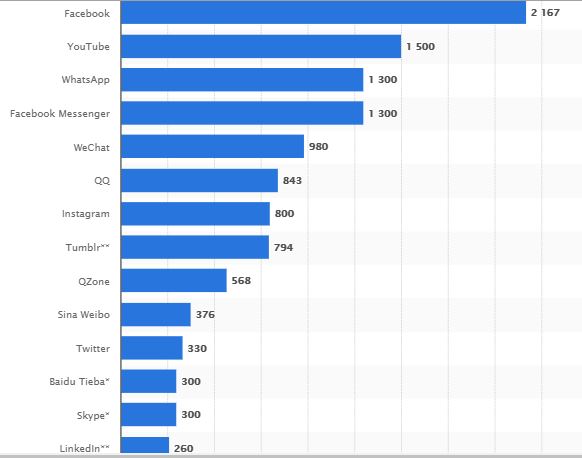Let’s face it, if you really were going to quit Facebook, you would have a few years ago. Fact is, you should have asked the serious questions when the ‘free’ social media platform started turning over billions of dollars.
No free service can generate that amount of money out of goodwill and thin air. So much that they could list on the stock exchange. So, we are not quite sure why everyone is acting amazed or why the knee-jerk #DeleteFacebook campaign is only now coming to light.
There really is no such thing as a free lunch. If you believe that all these online social platforms would keep it that way, then you are as naive as they are hoping you to be.
Think about it, the companies behind the platforms, actively recruit in pretty much tens and hundreds of cities globally.
And the simple fact of the matter is that in order for them to pay all their staff of programmers, developers, executives, lawyers, and other stakeholders. They need to be paid!
What your data means
Facebook, Google, Twitter, Snapchat, and any social media platform that has over 100 million users sit on a goldmine for advertisers.
The commodity, however, is not just what their users wish to own in the short term, or their purchasing power directly for that matter.
The commodity is simply you, the user. So, your preferences, habits, and views along with their personal data are analyzed via machine-learning systems to study behaviours and habits.
The data, in turn, is used for constant revenue maximization. In some extreme cases, it is used for political, psychological, and social manipulation!
“Your ‘payment’ on a social media platform is your consent to have your information used for marketing purposes. Opting out of marketing would give you true ‘free use’ of the service. But no profiteering company offers you that privilege today. The best you can get is a month’s free trial.”
Your likes, spending habits, music preferences, political views, location and working habits enables marketers to present their goods and services.
They can position their offerings (sometimes subliminally) into spaces where you are likely to indulge in them.
Social media platforms, in this case, become the marketplace for them to ‘mine’ data to use.
Social network sites worldwide as of January 2018, ranked by the number of active users (in millions).

Source: © Statista 2018
How the mining works
Data mining is not a new idea and completely legal if presented transparently in the terms and conditions of any service. The terms get longer by the day (small print) that we don’t bother to read them.
Microsoft envisioned this a decade ago and changed the way its operating systems work (with its Windows 8 series).
Its operating systems are now more of a social, interactive, and information gathering system. Allegedly designed to “help you” organize things better.
This is fostered by a voice-activated app called Cortana – all under one Microsoft account.
Amazon has its own ways of data mining via your shopping habits and Alexa – is its own voice-activated search and information-providing device.
Google (owned by Alphabet company) has the biggest stranglehold of the lot. They must, therefore, be the most cautious when it comes to data privacy and security.
This applies especially with its partnership with Android, which makes it a requirement for you to use for all their devices to link all your data.
These include phone contacts, emails via Gmail, pictures via GoogleDrive, apps (music, movies, etc) orders via the Google (Play)Store, and social media (Google+).
You can even have your search fields stored and synced onto your devices – from your laptop to phone and tablet via Google.
You are now having to give up your personal details to unknown affiliated marketers and partners of tech giants. They get first dibs on this data – and paying good money for it.
Read more about Affiliate Marketing here
Required by regulation
The main violation by Facebook, therefore, might not even be non-consensus selling of data to marketers. Such things could be countered with a clause.
They may have strategically stuck one in while you were busy posting selfies and liking random videos of cats.
The real issue is the potential use of the data for political or advanced manipulation of data for fraudulent purposes. This can be facilitated by the use of artificial intelligence to influence you without your knowledge.
Read more about the uses of Artificial Intelligence here
It is possible for you to have full data privacy and absolute freedom from advertising on social platforms. This, however, comes at a ‘cost’.
This was reiterated recently by the COO of Facebook who admittedly confirmed that ‘opting out’ would mean you will have to pay to use Facebook in the future.
They had just not put this in place but will now forcibly have to make it a clearly visible option.
The fact of the matter is we are in an era of Big Data, the Internet of Things (IoT), and AI. All of these require your data to ‘operate’.
Data mining is here to stay
Though many were reluctant at first, pretty much every company now has a Facebook, Twitter, or Instagram page. It serves as a platform to showcase and communicate with thier clients via the newly termed phrase ‘social engagement’.
This has turned out to become a strong branding and marketing tool for them.
And if you think you are out of it by leaving one platform, just remember this: Facebook owns WhatsApp & Instagram; Google owns YouTube; Microsoft owns LinkedIn, and so on.
There is, in fact, nowhere to hide if complete online privacy is important to you. And let’s not forget your web-browser: Not many of us actively use ad-blockers: but your browsing data is being scanned and processed by external third-parties companies.
If you aren’t using a Virtual Private Network (VPN), you should seriously consider it! Along with some good plug-ins to help secure your online browsing from all types of behind the scenes snooping and ransomware.
It will be interesting to see the outcome and verdict of the probe into the Facebook case.
Rest assured, many other heavily used platforms will be deleting and removing ties with data mining marketers. Especially ones that have had a similar agenda to what Cambridge Analytica was accused of conducting.








